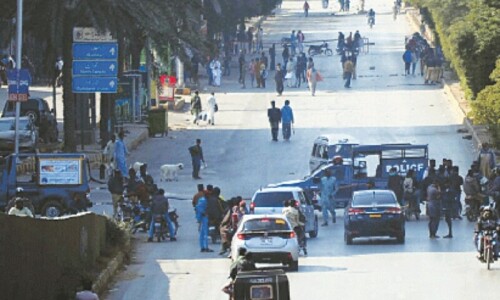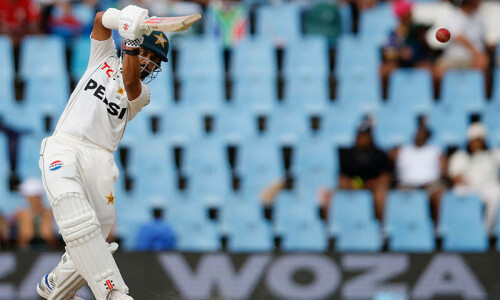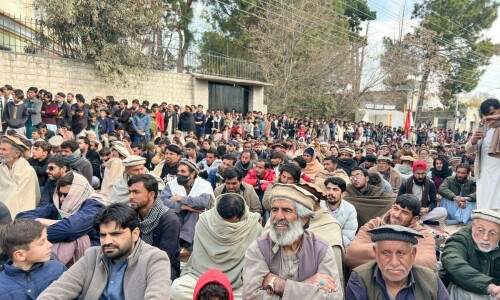SYED Masood Hasan Rizvi Adeeb belonged to the times when literature was not only a passion or profession, but it was also a way of life. In those days, enjoying poetry and being able to comment on its poetic and linguistic merits and demerits was common among even members of the working class. We know of a large number of Urdu poets who could not read or write but composed poetry. I won’t call them ‘illiterate’ because unlike today’s so-called educated youth, they knew the value of their language, literary traditions and culture. A scholarly work by Fida Ali Khanjar on the topic was serialised in the Anjuman Taraqqi-i-Urdu journal Urdu under the title Urdu ke un-parh shaer.
The scholars of those days were truly immersed in literature and it was only natural for them to be a poet, critic, researcher, linguist, teacher, student, mentor and disciple at the same time. Masood Hasan Rizvi Adeeb was just that kind of scholar.
Altaf Hussain Hali (1837-1914) in his Muqaddama-i-shear-o-shaeri had ruthlessly criticised Urdu classical poetry, especially ghazal and qaseeda (panegyric poems), for its hyperbolic style and limited approach. Muqaddama was a smashing success and it not only played a role in diverting our poetry, but was also instrumental in creating a new poetics. In fact, Hali is considered the pioneer when it comes to modern Urdu criticism. Many agreed with Hali wholeheartedly but some disagreed. Among those who disagreed, at least partially, was Masood Hasan Rizvi Adeeb. In his book Hamari shaeri Adeeb tried to defend Urdu classical poetry and stressed that not all was bad in the poetry composed by the poets of old schools contrary to what Hali had tried to establish.
Keeping in line with traditional moral values, Adeeb was careful not to challenge Hali’s point of view and in the preface he tried to convince readers that his book was an effort to address the issues that Hali left unanswered. Despite his carefully-worded justification, readers could see through his reverent attitude the issues on which he disagreed with Hali.
Research was another domain of Adeeb’s. Aside from discovering invaluable facts about Ghalib, Mir Taqi Mir and editing divan of Faaiz Dehlvi, Adeeb was considered an authority on Urdu marsiya (elegy), Mir Anees and the history and culture of Lucknow and Oudh. Lucknow was not Adeeb’s native town but he knew many natives of Lucknow whose ancestors had been living there for generations. Adeeb would gather information from them and with his research and insight would use the information in his works.
Yet another field that remains indebted to Adeeb is Urdu theatre and its history. Drama is comparatively a younger genre in Urdu but in the subcontinent theatre existed in ancient times. The great Sanskrit dramatist Kalidasa wrote plays as early as in the 5th century AD. But somehow both Hindi and Urdu drama could not take roots. Wajid Ali Shah, the ruler of Oudh, was a poet and took keen interest in musical dramas. In fact, Wajid Ali Shah was the pioneer of Urdu theatre. Adeeb carried out research on Wajid Ali Shah and his dramatic works. His books on Urdu theatre have rare information about Lucknow’s and Wajid Ali Shah’s contribution towards Urdu theatre.
Adopting Roman script for Urdu was an issue that raged in those days. Adeeb proved in his book Urdu zaban aur us ka rasm-i-khat that changing Urdu’s script would be detrimental to the language. Adeeb’s book Farhang-i-amsaal explains Arabic and Persian proverbs used in Urdu.
Syed Masood Hasan Rizvi Adeeb was born on July 29, 1893, in Bahraich, Uttar Pradesh. His father died when he was 10. A few years later he was sent to Lucknow to further his education. Adeeb did his BA in 1917. In 1925, he did his MA in Persian from Lucknow University. In 1922, he joined Lucknow University as lecturer and retired in 1954 as professor and the head of Persian department.
His other books are Aaina-i-sukhan fehmi, Aab-i-hayat ka tanqeedi mutal’a, Mutafarriqaat-i-Ghalib, Sultan-i-alam Wajid Ali Shah, Urdu drama aur stage, Lukhnav ka avami stage, Marasi-i-rekhta, Rooh-i-Anees, Aneesyaat and Faaiz Dehlvi aur divan-i-Faaiz.
Tahir Taunsvi was awarded a PhD for his research work on Masood Hasan Rizvi Adeeb and it was published by Majlis-i-Taraqqi-i-Adab, Lahore. Dr Anees Ashfaq’s book on Adeeb was published by Delhi’s Sahitya Academy.
Syed Masood Hasan Rizvi Adeeb died on Nov 29, 1975, in Lucknow.
Published in Dawn, December 1st, 2014















































Dear visitor, the comments section is undergoing an overhaul and will return soon.